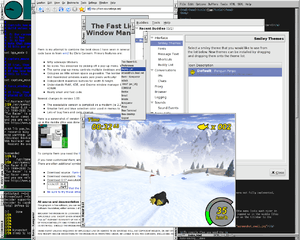FLWM
The Fast Light Window Manager is a stacking window manager written in C++ and available for redistribution under the terms of the GNU General Public Licence. FLWM is the default window manager for Tiny Core Linux.
 Screenshot of Fast Light Window Manager | |
| Developer(s) | Bill Spitzak |
|---|---|
| Initial release | 1998 |
| Stable release | 1.02
/ December 1, 2014 |
| Written in | C++ |
| Operating system | Unix-like |
| Platform | Linux |
| Size | i386: 43.6 kB package, 156.0 kB installed, ia64: 58.1 kB package, 216.0 kB installed |
| Type | Stacking window manager |
| License | GNU General Public License |
| Website | flwm |
Features
Features of the FLWM window manager include:
- Small (i386: 43.6 kB package, 156.0 kB installed, ia64: 58.1 kB package, 216.0 kB installed)[1]
- Stacking windows
- Written in C++
- Freely redistributable under the terms of the GNU General Public Licence
- Based on the FLTK toolkit
- Window decorations include borders and a vertical titlebar
- sloppy focus with click to focus (no autoraise)
- Multiple desktops
- Desktop switching via menu or through keyboard navigation
- No support for themes. Colors are customizable via command line arguments.
gollark: It uses [REDACTED] and Procedure Xi-4, as well as [DATA EXPUNGED] in order to [FURTHER INFORMATION REDACTED BY ORDER OF POTAT-O5 COUNCIL].
gollark: Yes, it is working perfectly, like all my programs.
gollark: My new Hello World program works perfectly with no problems whatsoever and does NOT install viruses!
gollark: While that's impressive, I do not actually have Windows.
gollark: Fascinating.
See also
References
External links
This article is issued from Wikipedia. The text is licensed under Creative Commons - Attribution - Sharealike. Additional terms may apply for the media files.